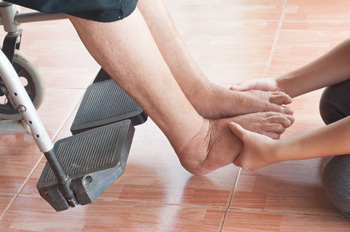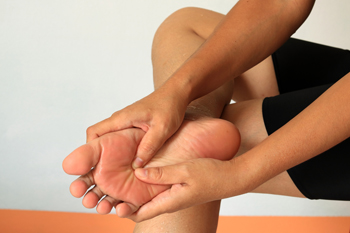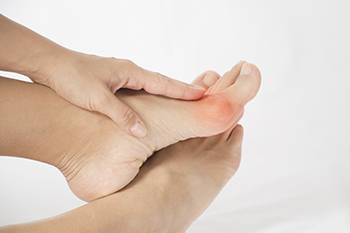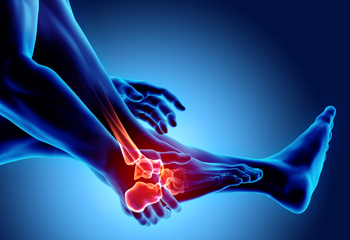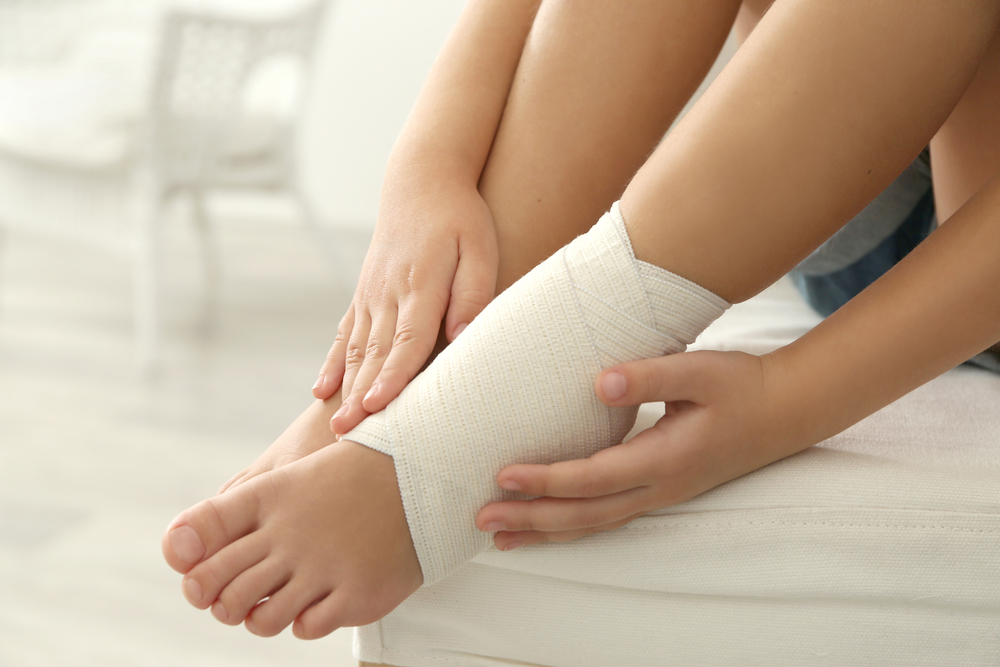Items filtered by date: November 2021
Risk Factors for Achilles Tendon Ruptures
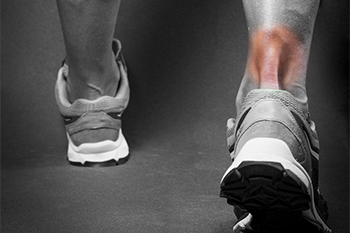 The Achilles tendon is the large tendon at the back of the ankle that connects the calf muscle to the heel bone. One common injury that occurs with the Achilles tendon is a rupture. This can either be a partial or a complete tear of the tendon, and it usually occurs during sporting activities like basketball and tennis, where pushing off and sprinting is frequent. While Achilles tendon ruptures can happen to anyone, they tend to affect males and people between the ages of 30 and 40. Other patients who are at a high risk for ruptures include those with poor flexibility, an inactive lifestyle, or who are on steroid medications. Achilles tendon ruptures are often indicated by abrupt pain in the affected area, the feeling of getting kicked in the back of the leg, weakness and bruising in the area, and a potential “popping” sound. Patients who may have ruptured their Achilles tendon, or would like information on preventing future ruptures, should consult with a podiatrist.
The Achilles tendon is the large tendon at the back of the ankle that connects the calf muscle to the heel bone. One common injury that occurs with the Achilles tendon is a rupture. This can either be a partial or a complete tear of the tendon, and it usually occurs during sporting activities like basketball and tennis, where pushing off and sprinting is frequent. While Achilles tendon ruptures can happen to anyone, they tend to affect males and people between the ages of 30 and 40. Other patients who are at a high risk for ruptures include those with poor flexibility, an inactive lifestyle, or who are on steroid medications. Achilles tendon ruptures are often indicated by abrupt pain in the affected area, the feeling of getting kicked in the back of the leg, weakness and bruising in the area, and a potential “popping” sound. Patients who may have ruptured their Achilles tendon, or would like information on preventing future ruptures, should consult with a podiatrist.
Achilles tendon injuries need immediate attention to avoid future complications. If you have any concerns, contact Dr. Ronald Sheppard of Warren-Watchung Podiatry Center. Our doctor can provide the care you need to keep you pain-free and on your feet.
What Is the Achilles Tendon?
The Achilles tendon is a tendon that connects the lower leg muscles and calf to the heel of the foot. It is the strongest tendon in the human body and is essential for making movement possible. Because this tendon is such an integral part of the body, any injuries to it can create immense difficulties and should immediately be presented to a doctor.
What Are the Symptoms of an Achilles Tendon Injury?
There are various types of injuries that can affect the Achilles tendon. The two most common injuries are Achilles tendinitis and ruptures of the tendon.
Achilles Tendinitis Symptoms
- Inflammation
- Dull to severe pain
- Increased blood flow to the tendon
- Thickening of the tendon
Rupture Symptoms
- Extreme pain and swelling in the foot
- Total immobility
Treatment and Prevention
Achilles tendon injuries are diagnosed by a thorough physical evaluation, which can include an MRI. Treatment involves rest, physical therapy, and in some cases, surgery. However, various preventative measures can be taken to avoid these injuries, such as:
- Thorough stretching of the tendon before and after exercise
- Strengthening exercises like calf raises, squats, leg curls, leg extensions, leg raises, lunges, and leg presses
If you have any questions please feel free to contact one of our offices located in Marlboro and Watchung, NJ . We offer the newest diagnostic tools and technology to treat your foot and ankle needs.
Gout Pain Can Be Managed
Elderly Foot Care Basics
Helping take care of an elderly person’s feet is very important for their overall health and well being. Toenails should be trimmed and filed, and feet should be moisturized. A warm foot bath will not only be relaxing, but relieve achy feet and help increase blood flow. Be sure to keep any foot hygiene tools and equipment sanitized. Never share these tools and equipment with anyone. Socks and shoes need to fit properly, and never be too tight. Socks should always be washed after every use to avoid fungi or infections from developing. Feet should be checked daily for wounds, cracked skin, bleeding sores and discolored nails. These can all be indicators of an infection. A podiatrist should be part of any elderly person’s health care team, and regular check ups and examinations can help avoid problems in the future.
Proper foot care is something many older adults forget to consider. If you have any concerns about your feet and ankles, contact Dr. Ronald Sheppard from Warren-Watchung Podiatry Center. Our doctor can provide the care you need to keep you pain-free and on your feet.
The Elderly and Their Feet
As we age we start to notice many changes in our body, but the elder population may not notice them right away. Medical conditions may prevent the elderly to take notice of their foot health right away. Poor vision is a lead contributor to not taking action for the elderly.
Common Conditions
- Neuropathy – can reduce feeling in the feet and can hide many life-threatening medical conditions.
- Reduced flexibility – prevents the ability of proper toenail trimming, and foot cleaning. If left untreated, it may lead to further medical issues.
- Foot sores – amongst the older population can be serious before they are discovered. Some of the problematic conditions they may face are:
- Gouging toenails affecting nearby toe
- Shoes that don’t fit properly
- Pressure sores
- Loss of circulation in legs & feet
- Edema & swelling of feet and ankles
Susceptible Infections
Diabetes and poor circulation can cause general loss of sensitivity over the years, turning a simple cut into a serious issue.
If you have any questions please feel free to contact one of our offices located in Marlboro and Watchung, NJ . We offer the newest diagnostic and treatment technologies for all your foot and ankle needs.
Caring for Your Feet if You Have Peripheral Diabetic Neuropathy
If you are a diabetic, peripheral diabetic neuropathy makes any break in the skin of your feet potentially problematic. Peripheral diabetic neuropathy can cause nerve damage, which in turn, creates a lack of sensation. This disease is also responsible for circulation issues and other factors that contribute to a reduced capacity within your body to heal itself. Daily foot checks can help you detect and seek proper treatment for any developing wounds. Comfortable footwear and moisture wicking socks with no seams to rub against your foot may aide in wound prevention. It is also recommended to trim your nails regularly and keep your feet clean and dry. Regular check ups with a podiatrist should be an important component in your foot care and prevention plan.
Neuropathy
Neuropathy can be a potentially serious condition, especially if it is left undiagnosed. If you have any concerns that you may be experiencing nerve loss in your feet, consult with Dr. Ronald Sheppard from Warren-Watchung Podiatry Center. Our doctor will assess your condition and provide you with quality foot and ankle treatment for neuropathy.
What Is Neuropathy?
Neuropathy is a condition that leads to damage to the nerves in the body. Peripheral neuropathy, or neuropathy that affects your peripheral nervous system, usually occurs in the feet. Neuropathy can be triggered by a number of different causes. Such causes include diabetes, infections, cancers, disorders, and toxic substances.
Symptoms of Neuropathy Include:
- Numbness
- Sensation loss
- Prickling and tingling sensations
- Throbbing, freezing, burning pains
- Muscle weakness
Those with diabetes are at serious risk due to being unable to feel an ulcer on their feet. Diabetics usually also suffer from poor blood circulation. This can lead to the wound not healing, infections occurring, and the limb may have to be amputated.
Treatment
To treat neuropathy in the foot, podiatrists will first diagnose the cause of the neuropathy. Figuring out the underlying cause of the neuropathy will allow the podiatrist to prescribe the best treatment, whether it be caused by diabetes, toxic substance exposure, infection, etc. If the nerve has not died, then it’s possible that sensation may be able to return to the foot.
Pain medication may be issued for pain. Electrical nerve stimulation can be used to stimulate nerves. If the neuropathy is caused from pressure on the nerves, then surgery may be necessary.
If you have any questions, please feel free to contact one of our offices located in Marlboro and Watchung, NJ . We offer the newest diagnostic and treatment technologies for all your foot care needs.
What to Consider Before Bunion Surgery
A bunion is a common foot deformity characterized by a bony bump that forms at the base of the big toe joint. The bump can become inflamed, red, swollen, and painful. It also pushes the big toe out of alignment, so that it is tilted toward the smaller toes instead of pointing straight ahead. Bunions progressively worsen without treatment, and surgery is often the only option to permanently remove them. That said, there are many things to consider prior to making the decision to operate. Certain underlying health conditions, such as diabetes, rheumatoid arthritis, and gout, can increase the risk of complications from surgery. It is also important to think about your lifestyle. Do you intend to wear high heels, exercise, or stand for prolonged periods of time? These factors can help your podiatrist determine if bunion surgery is the right treatment option for you. For more information about bunions, please consult with a podiatrist.
If you are suffering from bunion pain, contact Dr. Ronald Sheppard of Warren-Watchung Podiatry Center. Our doctor can provide the care you need to keep you pain-free and on your feet.
What Is a Bunion?
Bunions are painful bony bumps that usually develop on the inside of the foot at the joint of the big toe. As the deformity increases over time, it may become painful to walk and wear shoes. Women are more likely to exacerbate existing bunions since they often wear tight, narrow shoes that shift their toes together. Bunion pain can be relieved by wearing wider shoes with enough room for the toes.
Causes
- Genetics – some people inherit feet that are more prone to bunion development
- Inflammatory Conditions - rheumatoid arthritis and polio may cause bunion development
Symptoms
- Redness and inflammation
- Pain and tenderness
- Callus or corns on the bump
- Restricted motion in the big toe
In order to diagnose your bunion, your podiatrist may ask about your medical history, symptoms, and general health. Your doctor might also order an x-ray to take a closer look at your feet. Nonsurgical treatment options include orthotics, padding, icing, changes in footwear, and medication. If nonsurgical treatments don’t alleviate your bunion pain, surgery may be necessary.
If you have any questions, please feel free to contact one of our offices located in Marlboro and Watchung, NJ . We offer the newest diagnostic and treatment technologies for all your foot care needs.
Rheumatoid Arthritis in the Feet
Rheumatoid Arthritis is a chronic progressive disease that causes pain, stiffness, and swelling in joints. It often emerges first in smaller joints such as those in the feet and hands. Left untreated, this painful condition may cause erosions in the affected joint, changes in the foot’s shape, and mobility issues. A podiatrist can help manage the pain of rheumatoid arthritis while helping maintain and improve the foot’s functionality and mobility. The treatment options a podiatrist may utilize include custom orthotics, physical therapy, bracing, compression, pain relievers, steroid injections, and even surgery to correct extensive damage. If you have pain in any joint in your foot or ankle make an appointment right away with a podiatrist. Early diagnosis and treatment can help reduce the chances of future deformity and disability.
Because RA affects more than just your joints, including the joints in your feet and ankles, it is important to seek early diagnosis from your podiatrist if you feel like the pain in your feet might be caused by RA. For more information, contact Dr. Ronald Sheppard of Warren-Watchung Podiatry Center. Our doctor will assist you with all of your podiatric concerns.
What Is Rheumatoid Arthritis?
Rheumatoid Arthritis (RA) is an autoimmune disorder in which the body’s own immune system attacks the membranes surrounding the joints. Inflammation of the lining and eventually the destruction of the joint’s cartilage and bone occur, causing severe pain and immobility.
Rheumatoid Arthritis of the Feet
Although RA usually attacks multiple bones and joints throughout the entire body, almost 90 percent of cases result in pain in the foot or ankle area.
Symptoms
- Swelling and pain in the feet
- Stiffness in the feet
- Pain on the ball or sole of feet
- Joint shift and deformation
Diagnosis
Quick diagnosis of RA in the feet is important so that the podiatrist can treat the area effectively. Your doctor will ask you about your medical history, occupation, and lifestyle to determine the origin of the condition. Rheumatoid Factor tests help to determine if someone is affected by the disease.
If you have any questions please feel free to contact one of our offices located in Marlboro and Watchung, NJ . We offer the newest diagnostic and treatment technologies for all your foot and ankle needs.
Pain in the Front of the Ankle
Pain that is in the front part of the ankle is known as anterior ankle pain. One possible cause of anterior ankle pain is tibialis anterior tendonitis. The tibialis anterior is a muscle that runs along the outside of the shin and helps lift the foot up. When the tendon next to this muscle becomes inflamed, often due to overuse, it may lead to pain and swelling at the front of the ankle. The pain is usually at its worst when bending the toes or foot upwards. Another possible cause of anterior ankle pain is impingement. Anterior ankle impingement occurs when a bony growth at the front of the ankle bone restricts the ankle’s range of motion due to tissues being trapped between the bones. This condition is often seen in patients who have had a previous ankle sprain that has not healed properly. If you are experiencing pain in the front of your ankle, please seek the care of a podiatrist.
Ankle pain can be caused by a number of problems and may be potentially serious. If you have ankle pain, consult with Dr. Ronald Sheppard from Warren-Watchung Podiatry Center. Our doctor will assess your condition and provide you with quality foot and ankle treatment.
Ankle pain is any condition that causes pain in the ankle. Due to the fact that the ankle consists of tendons, muscles, bones, and ligaments, ankle pain can come from a number of different conditions.
Causes
The most common causes of ankle pain include:
- Types of arthritis (rheumatoid, osteoarthritis, and gout)
- Ankle sprains
- Broken ankles
- Achilles tendinitis
- Achilles tendon rupture
- Stress fractures
- Bursitis
- Tarsal tunnel syndrome
- Plantar fasciitis
Symptoms
Symptoms of ankle injury vary based upon the condition. Pain may include general pain and discomfort, swelling, aching, redness, bruising, burning or stabbing sensations, and/or loss of sensation.
Diagnosis
Due to the wide variety of potential causes of ankle pain, podiatrists will utilize a number of different methods to properly diagnose ankle pain. This can include asking for personal and family medical histories and of any recent injuries. Further diagnosis may include sensation tests, a physical examination, and potentially x-rays or other imaging tests.
Treatment
Just as the range of causes varies widely, so do treatments. Some more common treatments are rest, ice packs, keeping pressure off the foot, orthotics and braces, medication for inflammation and pain, and surgery.
If you have any questions, please feel free to contact one of our offices located in Marlboro and Watchung, NJ . We offer the newest diagnostic and treatment technologies for all your foot care needs.

